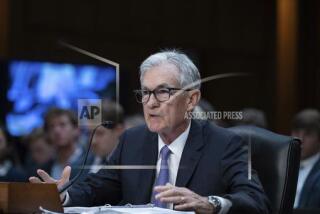Volcker Says Dollar’s Fall Nears a ‘Dangerous Point’
- Share via
WASHINGTON — Federal Reserve Board Chairman Paul A. Volcker renewed his warning Monday that the dollar has weakened enough, telling Congress that the sharp drop in value in recent weeks has brought the dollar to “a dangerous point” beyond which accelerating inflation could return.
Making his semiannual assessment of the state of the economy, Volcker told the Joint Economic Committee that the Fed may be running out of room for further cuts in the discount rate, even if the still-sluggish economy should need more stimulation.
“Over the past year or more, as inflation has subsided and with limited economic growth, the Federal Reserve has been able to accommodate a rapid growth in money, and the discount rate has been reduced on several occasions,” Volcker said. “Clearly, renewed inflationary pressures and weakness in the dollar externally would be factors limiting our flexibility.”
Volcker challenged Congress to do its part to help the economy by dealing with the huge budget deficit and trade imbalance.
As he has in the past, Volcker said he believes that spending cuts would be more beneficial economically than higher taxes, but he hinted that he would favor an import tax on petroleum or some other energy tax if raising more revenue becomes absolutely necessary. An energy tax “is the obvious place to look if you want to raise revenue,” he said.
Seeking to spur the economy, the Fed four times last year lowered the basic rate banks pay to borrow from the Federal Reserve system. The discount rate has been anchored at 5.5% since last August, and there have been recurrent market rumors that the Fed would soon cut the rate again. Volcker’s remarks were an unusually explicit warning against such expectations.
The dollar’s drop to near-record lows against the yen, the West German mark and other currencies has aided American manufacturers by making their goods less expensive in world markets and foreign competitors’ more costly.
But Volcker said the trend is reaching a danger point. “We have been fortunate up to now that the (dollar’s) decline has not been accompanied by high import prices,” he said. “But if we move from the present level, there could be more pass-through (to American consumers of higher prices from foreign exporters). We are at a more dangerous point now” of spurring inflation, he said.
More to Read
Inside the business of entertainment
The Wide Shot brings you news, analysis and insights on everything from streaming wars to production — and what it all means for the future.
You may occasionally receive promotional content from the Los Angeles Times.










